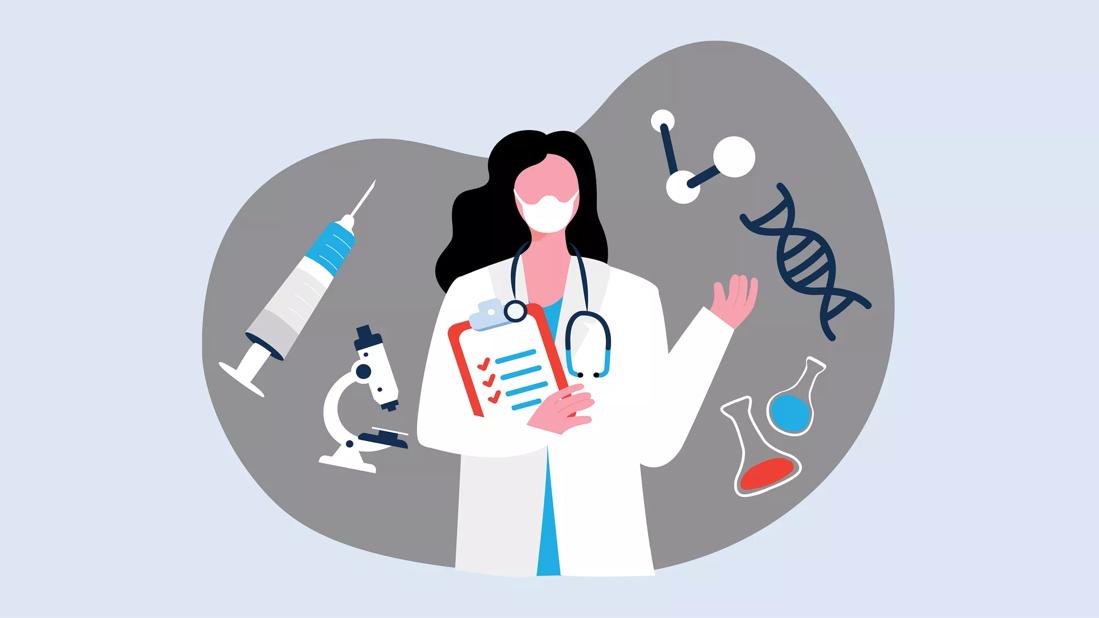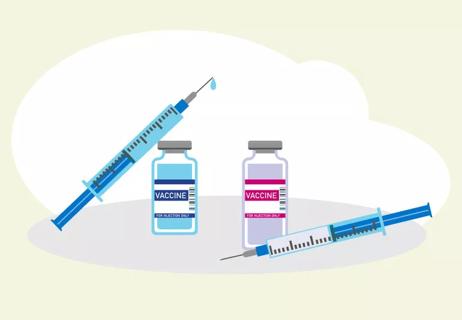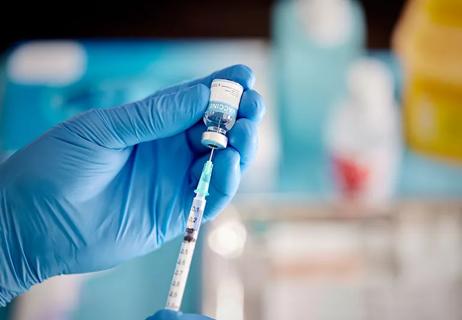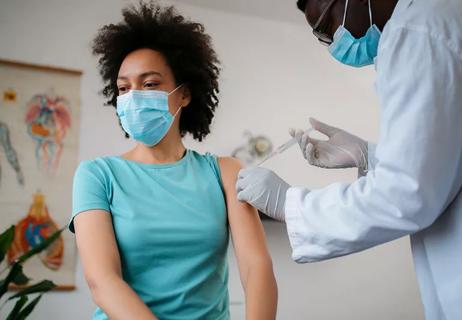The answer varies from person to person and vaccine to vaccine

For people with compromised immune systems, getting vaccinated often involves making complex decisions. The protection a vaccine provides is important in preventing illness. But do vaccines come with added risks?
Advertisement
Cleveland Clinic is a non-profit academic medical center. Advertising on our site helps support our mission. We do not endorse non-Cleveland Clinic products or services. Policy
Maybe conditions like rheumatoid arthritis or Crohn’s disease have weakened your immune system. Maybe medications like biologics or monoclonal antibodies are the culprit. Either way, you should check with your healthcare provider before receiving a vaccine.
Rheumatologic and immunologic disease specialist Cassandra Calabrese, DO, explains what risks and options patients should consider.
Your immune system can be compromised in several different ways. One example is an immunodeficiency like an acquired disease like HIV, or a congenital (born with) condition like common variable immunodeficiency (CVID).
But common autoimmune inflammatory diseases can leave your immune system weakened, too. These include multiple sclerosis (MS), Crohn's disease, rheumatoid arthritis, psoriasis and many others.
Medications play a part as well.
There are several different kinds of medications that can suppress your immune system. One widely used class of immunosuppressants is biologics. This type of drug can treat everything from gout and cancer to diabetes and inflammatory bowel disease. Dr. Calabrese says that these drugs are designed to quiet your immune system and stop it from turning on itself.
Advertisement
The simple answer is no: Vaccines aren’t always off limits if you’re immunocompromised. And being up-to-date with recommended vaccines is important because your condition (or the medical treatments you’re on, depending on your health circumstances) can place you at increased risk of infections that vaccines can help prevent.
But there are certain factors you and your provider have to consider when determining which vaccines you should be getting, including the type of vaccine, your diagnosis and the type of medications you’re on.
“Live vaccines — such as the measles, mumps and rubella (MMR) vaccine — should generally be avoided in the setting of immunosuppression because they can cause infection,” Dr. Calabrese explains. “Most vaccines, however, aren't live and are generally recommended for people who are immunocompromised. That said, certain immunosuppressive medications may reduce the effectiveness of vaccines.”
Other factors come into play, too. For example, your risk-benefit calculation may shift based on your lifestyle. Yellow fever vaccination, for example, is more important if you live in an area where the disease is endemic.
If you have a compromised immune system, talk to your doctor about risks and benefits specific to your condition and any other factors that you think are important to keep in mind. Then, Dr. Calabrese advises weighing your options carefully.
Being immunocompromised can impact the timing and effectiveness of vaccines. And in the case of live vaccines, it can also raise your risk of complications.
If your immune system isn’t functioning properly, it might not respond to vaccines effectively — or at all.
“People who are immunocompromised sometimes need additional doses or more frequent boosters to make sure they’re adequately protected,” Dr. Calabrese notes.
In some cases, timing is everything. People whose disease may progress to the point of needing an organ transplant in a few years, for example, might want to get vaccinated sooner rather than later.
“Anybody who’s a candidate should get routine vaccinations while they still can,” Dr. Calabrese states.
Time can also be important for logistical reasons. If you’re getting infusions to treat your condition, for example, you may have to schedule around them or wait longer in between doses.
“It’s best to be vaccinated before starting immunosuppressive medications, but it isn’t always possible. Some protection is better than no protection at all, so speak with your doctor about ideal timing,” Dr. Calabrese advises.
So-called “live” vaccines carry the biggest risk for people who are immunocompromised. Examples of live vaccines include the chickenpox vaccine (varicella), the measles, mumps and rubella (MMR) vaccine, and yellow fever vaccines. The FluMist® version of the flu vaccine is live, too.
Advertisement
For people who aren’t immunocompromised, live vaccines gently “poke” their immune system to create antibodies. If your immune response is compromised, a live virus vaccine may:
In rare (but serious) cases, Dr. Calabrese says that a live virus vaccine can cause your immune system to become so suppressed that it enters the bloodstream. This means that instead of just presenting in one area, the virus or bacteria can show up everywhere in your body. It’s called viremia if it’s a virus that’s been disseminated through your bloodstream and bacteremia if it’s bacteria.
“Both viremia and bacteremia can be fatal without prompt treatment,” he adds.
All COVID-19 vaccines currently available in the U.S. are inactivated. That means you can’t get COVID-19 from them. The U.S. Centers for Disease Control and Prevention (CDC) recommends that most adults over the age of 18 — including those who are moderately or severely immunocompromised — get and stay up-to-date with COVID-19 vaccines.
It’s still important to speak to your providers about getting vaccinated as, just like any other vaccine, your personal health situation may complicate things.
Advertisement
There are a couple of factors Dr. Calabrese recommends keeping in mind:
As the COVID-19 pandemic taught us, vaccine development is getting more sophisticated all the time. And it can be hard to keep up. Case in point: shingles prevention.
“Up until 2020, the only shingles vaccines we had available were live virus vaccines. That made preventive care a no-go for many people,” Dr. Calabrese says. “Then, a more effective, inactivated vaccine called Shingrix® came out. Now, we can advise people who are immunocompromised to get the vaccine.”
Check in with your primary care provider regularly to see if there have been any changes that could impact your vaccine eligibility.
Being immunocompromised means different things for different people. It can be temporary or permanent, inherited or acquired, and mild, moderate or severe. Two people with the exact same condition may have different needs and vulnerabilities.
Advertisement
While there are some general principles providers can follow, there isn’t a one-size-fits-all approach to vaccination against infectious diseases. If you’re immunocompromised, talk to your doctor about each potential vaccine you could get, as well as alternative prevention methods. Together, you can run through your options and make an informed decision.
Learn more about our editorial process.
Advertisement

Tetanus is easy to prevent but tough to treat — vaccines are your best defense

Older studies suggesting a link have been completely discredited — vaccinations are safe and effective

From influenza and COVID-19 to pneumococcal, shingles and more, vaccines help keep you healthy

Baby’s caregivers should be up-to-date on flu, COVID-19 and Tdap vaccines to protect the newborn in their lives

Getting routine vaccinations together can save you time and may be more effective

They can stop an infection before it gets you sick or prevent you from becoming seriously sick

Previous vaccines against smallpox might provide some protection

Pain after a vaccine is normal — but here's how you can avoid it

Wearing a scarf, adjusting your outdoor activities and following your asthma treatment plan can help limit breathing problems

Your diet in the weeks, days and hours ahead of your race can power you to the finish line

When someone guilt trips you, they’re using emotionally manipulative behavior to try to get you to act a certain way